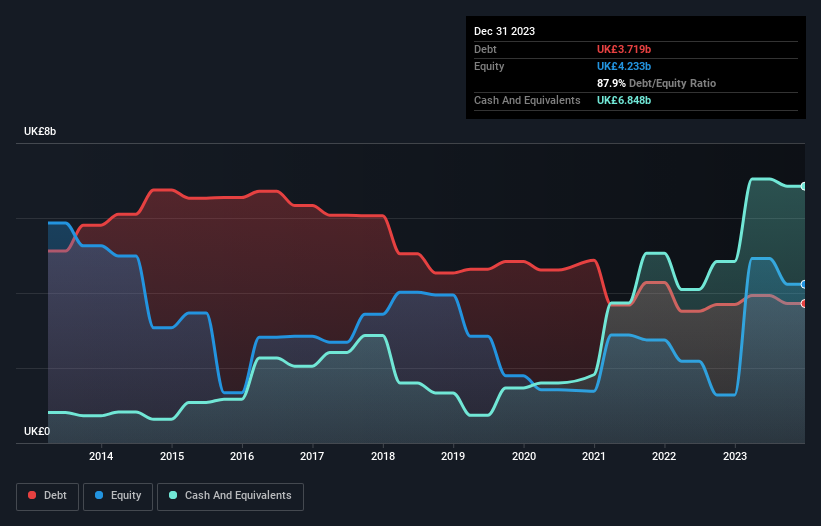
The external fund manager backed by Berkshire Hathaway's Charlie Munger, Li Lu, makes no bones about it when he says 'The biggest investment risk is not the volatility of prices, but whether you will suffer a permanent loss of capital.' When we think about how risky a company is, we always like to look at its use of debt, since debt overload can lead to ruin. We can see that Centrica plc (LON:CNA) does use debt in its business. But is this debt a concern to shareholders?
Why Does Debt Bring Risk?
Debt is a tool to help businesses grow, but if a business is incapable of paying off its lenders, then it exists at their mercy. Part and parcel of capitalism is the process of 'creative destruction' where failed businesses are mercilessly liquidated by their bankers. However, a more common (but still painful) scenario is that it has to raise new equity capital at a low price, thus permanently diluting shareholders. Of course, debt can be an important tool in businesses, particularly capital heavy businesses. When we examine debt levels, we first consider both cash and debt levels, together.
View our latest analysis for Centrica
How Much Debt Does Centrica Carry?
As you can see below, Centrica had UK£3.72b of debt, at December 2023, which is about the same as the year before. You can click the chart for greater detail. However, it does have UK£6.85b in cash offsetting this, leading to net cash of UK£3.13b.

How Strong Is Centrica's Balance Sheet?
Zooming in on the latest balance sheet data, we can see that Centrica had liabilities of UK£11.1b due within 12 months and liabilities of UK£6.00b due beyond that. Offsetting this, it had UK£6.85b in cash and UK£4.89b in receivables that were due within 12 months. So it has liabilities totalling UK£5.40b more than its cash and near-term receivables, combined.
This is a mountain of leverage relative to its market capitalization of UK£7.01b. This suggests shareholders would be heavily diluted if the company needed to shore up its balance sheet in a hurry. While it does have liabilities worth noting, Centrica also has more cash than debt, so we're pretty confident it can manage its debt safely. There's no doubt that we learn most about debt from the balance sheet. But it is future earnings, more than anything, that will determine Centrica's ability to maintain a healthy balance sheet going forward. So if you want to see what the professionals think, you might find this free report on analyst profit forecasts to be interesting.
In the last year Centrica wasn't profitable at an EBIT level, but managed to grow its revenue by 11%, to UK£26b. That rate of growth is a bit slow for our taste, but it takes all types to make a world.
So How Risky Is Centrica?
While Centrica lost money on an earnings before interest and tax (EBIT) level, it actually booked a paper profit of UK£3.9b. So taking that on face value, and considering the cash, we don't think its very risky in the near term. Until we see some positive EBIT, we're a bit cautious of the stock, not least because of the rather modest revenue growth. When analysing debt levels, the balance sheet is the obvious place to start. However, not all investment risk resides within the balance sheet - far from it. For instance, we've identified 3 warning signs for Centrica (2 are a bit concerning) you should be aware of.
When all is said and done, sometimes its easier to focus on companies that don't even need debt. Readers can access a list of growth stocks with zero net debt 100% free, right now.
New: AI Stock Screener & Alerts
Our new AI Stock Screener scans the market every day to uncover opportunities.
• Dividend Powerhouses (3%+ Yield)
• Undervalued Small Caps with Insider Buying
• High growth Tech and AI Companies
Or build your own from over 50 metrics.
Have feedback on this article? Concerned about the content? Get in touch with us directly. Alternatively, email editorial-team (at) simplywallst.com.
This article by Simply Wall St is general in nature. We provide commentary based on historical data and analyst forecasts only using an unbiased methodology and our articles are not intended to be financial advice. It does not constitute a recommendation to buy or sell any stock, and does not take account of your objectives, or your financial situation. We aim to bring you long-term focused analysis driven by fundamental data. Note that our analysis may not factor in the latest price-sensitive company announcements or qualitative material. Simply Wall St has no position in any stocks mentioned.
About LSE:CNA
Centrica
Operates as an integrated energy company in the United Kingdom, Ireland, Scandinavia, North America, and internationally.
Flawless balance sheet slight.
Similar Companies
Market Insights
Community Narratives





